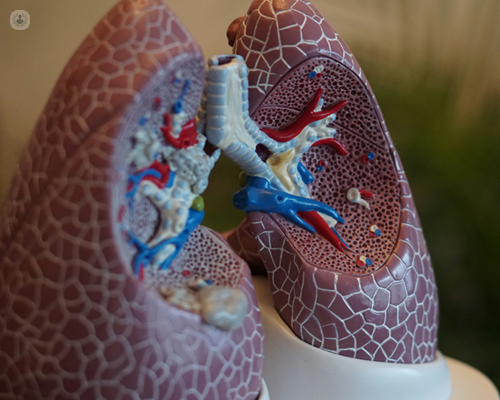The importance of having a lung cancer screening
Escrito por:Lung cancer is one of the leading causes of cancer-related deaths worldwide. Early detection through screening can significantly improve the chances of successful treatment and survival. Here, leading consultant in respiratory and general medicine Dr Anjani Prasad talks about the importance of lung cancer screening, who should consider it, and what the screening process involves.

Why is Lung Cancer Screening Important?
Early detection of lung cancer is crucial for several reasons:
- Improved Survival Rates: Detecting lung cancer at an early stage can significantly increase the likelihood of successful treatment and long-term survival.
- Reduced Mortality: Screening can reduce the number of deaths caused by lung cancer by identifying the disease before symptoms appear.
- Less Invasive Treatments: Early-stage lung cancers often require less aggressive treatment compared to more advanced stages, leading to better outcomes and fewer side effects.
Who Should Consider Lung Cancer Screening?
Lung cancer screening is particularly important for individuals at higher risk of developing the disease. The following groups are generally recommended to consider screening:
- Smokers and Former Smokers: Individuals aged 50 to 80 years who have a significant history of smoking (20 pack-years or more) and currently smoke or have quit within the past 15 years.
- Exposure to Carcinogens: People with a history of exposure to harmful substances like asbestos, radon, or other carcinogens.
- Family History: Individuals with a family history of lung cancer may also be at increased risk and should discuss screening with their healthcare provider.
What Does the Screening Process Involve?
Lung cancer screening typically involves a low-dose computed tomography (LDCT) scan, which is a specialized type of X-ray that creates detailed images of the lungs.
The Screening Procedure:
- Preparation: Before the scan, you may be asked to avoid eating or drinking for a few hours. Wear loose, comfortable clothing, and remove any metal objects.
- The Scan: During the scan, you will lie on a table that slides into the CT scanner. You will need to remain still and may be asked to hold your breath for a few seconds to ensure clear images.
- Duration: The scan itself is quick, usually taking only a few minutes.
Follow-Up:
- Results: A radiologist will review the images and send a report to your healthcare provider. The results can indicate whether there are any abnormalities that require further investigation.
- Next Steps: If any suspicious areas are found, additional tests such as a biopsy or further imaging may be recommended to determine if cancer is present.
Benefits and Risks of Lung Cancer Screening
Benefits:
- Early Detection: The primary benefit of screening is the early detection of lung cancer, which can lead to more effective treatment.
- Reduced Mortality: Studies have shown that LDCT screening can reduce lung cancer mortality by 20% in high-risk populations.
Risks:
- False Positives: Screening may sometimes detect abnormalities that are not cancer, leading to unnecessary tests and procedures.
- Radiation Exposure: Although the radiation dose from LDCT is low, repeated exposure over time can increase the risk of radiation-related complications.
Lung cancer screening is a vital tool in the early detection and treatment of lung cancer, especially for individuals at higher risk. By identifying the disease at an earlier, more treatable stage, screening can significantly improve outcomes and reduce mortality. If you fall into a high-risk category, discuss with your healthcare provider whether Lung cancer screening is appropriate for you. Regular screenings and proactive health measures can make a crucial difference in the fight against lung cancer.
Do you require expert lung cancer screening? Arrange a consultation with Dr Prasad via his Top Doctors profile.


